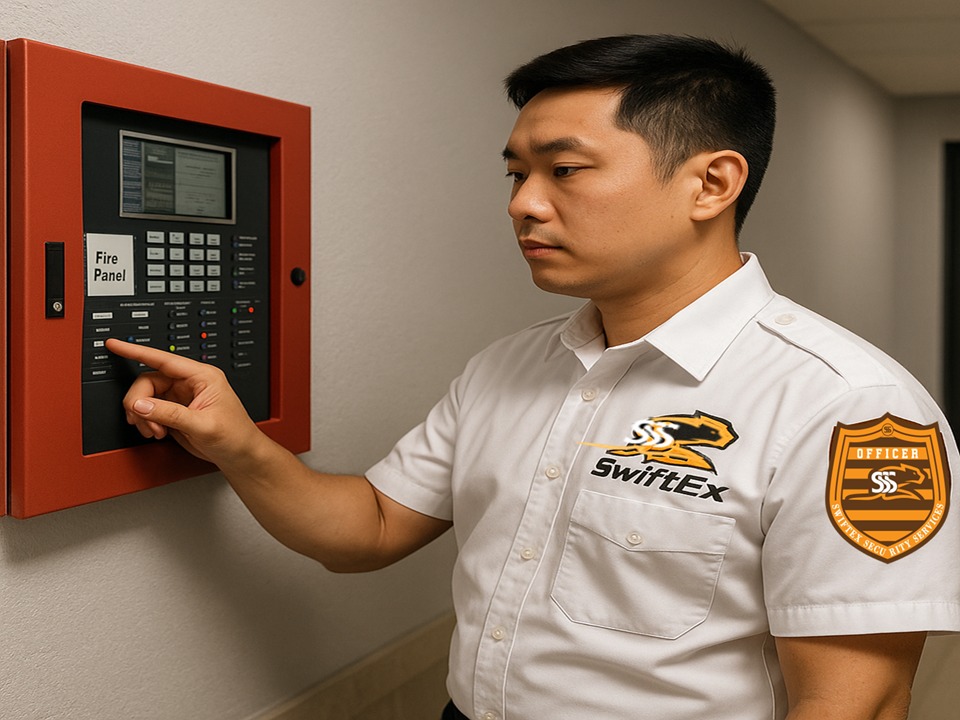
Loading...

Loading...

It's 3:17 AM on a Tuesday, and the phone on your nightstand buzzes with a call you or any property manager ever wants to get. It's the overnight crew at your building in Midtown. "There's a problem," they say, and you can hear the panic in their voice. "A sprinkler pipe burst on the 25th floor. There's water everywhere." You're out of bed and in a cab before you could have coffee. By the time you arrive, the sprinkler repair company is already there, assessing the damage. The good news? They can fix it. The bad news? The entire building's fire suppression system needs to shut down for at least 12 hours. However, here's the relief: Swiftex is on the way, ready to provide the necessary fire watch services to keep your business running.
And that's when the real problem hits you. It's not the water damage or the repair bill. The fact is that you're now operating an occupied high-rise in New York City without a functioning fire protection system. The knot in your stomach tightens. You know what that means: a massive compliance nightmare, the risk of a stop-work order from the Fire Department of New York (FDNY), and liability that could sink your budget for the year. The clock is officially ticking, and the consequences of non-compliance are severe.
Here's something you learn fast as a building manager, facility director, or construction supervisor in New York City: the FDNY doesn't do "suggestions." When a fire protection system—like your sprinklers or fire alarm—is out of service, the NYC Fire Code is crystal clear. You are legally required to implement a Fire Watch.
So, what exactly is a Fire Watch? It's not just having a security guard stand by the front door. It's a temporary but continuous patrol of the affected area by one or more certified professionals whose only job is to watch for fire, know how to respond, and be ready to notify the FDNY at a moment's notice. A fire watch is not just a formality; it's a crucial part of maintaining fire safety during system outages.
And here's where it gets interesting. The FDNY gives you a very short leash. For the first four hours of a system outage (in an area under 50,000 square feet), a trained and knowledgeable person on your staff can handle the watch. But the second that clock ticks past the four-hour mark, the rules change. The watch must be conducted by a professional holding a specific FDNY Certificate of Fitness.
Ignoring this isn't an option you would want because the consequences can be severe: immediate stop-work orders, crippling fines, and a massive increase in legal liability should a fire actually occur. We've all heard the stories—even high-profile, brand-new buildings have faced scandals and major violations for cutting corners on fire safety compliance. It's a risk you can't afford to take.
This scenario is where Swiftex delivers smarter protection. Hiring a fire watch isn't about getting a warm body in a uniform. It's about hiring a compliance expert with the proper credentials. In NYC, that means an FDNY Certificate of Fitness (COF). A regular security guard, irrespective of how experienced, cannot legally perform fire watch duties in New york City unless they hold the proper, specific certification for the situation.
The different codes can feel like an alphabet soup of regulations. But don't worry, we speak the language fluently. Here's a simple cheat sheet for the certifications that matter most:
|
Certificate |
Official Name |
When You Need It (In Simple Terms) |
Swiftex Has You Covered |
|
F-01 |
Citywide Fire Guard for Impairment |
This is the workhorse for most emergencies. You need it when your sprinkler or fire alarm system is out of service in any commercial building, residential high-rise, or construction site |
✅ |
|
F-02 |
Fire Guard for Shelters |
This is specifically required for homeless or emergency shelters. These locations have unique evacuation challenges and safety plans for protecting vulnerable populations. |
✅ |
|
F-60 |
Fire Guard for Torch Operations |
This is non-negotiable for construction sites doing "hot work"—think welding, torch-cutting, or brazing. Sparks fly, and the risk is high, so a dedicated, certified guard is mandatory. |
✅ |
|
F-80 |
Coordinator of Fire Safety |
This is a higher-level supervisory role required in homeless shelters to manage the overall fire safety plan and oversee the F-02 Fire Guards on duty. |
✅ |
A Swiftex fire guard arrives on-site not only with certification, but also with a comprehensive toolkit for compliance. They conduct continuous, systematic patrols. They are trained in the use of portable fire extinguishers. They carry communication gear to contact the FDNY instantly. And most importantly, they maintain a meticulous, detailed logbook of their activities—a critical compliance document that fire marshals will demand to see during an inspection. Their expertise and preparedness will give you the confidence that your fire watch needs are in good hands.